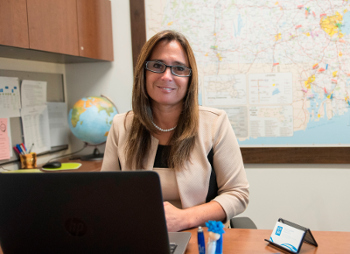Do you have a question about JRI services?

When Ms. Cheryl met Charlie, he was a year old, very thin, and did not make the usual babbling/speech sounds for a child his age. He acclimated fairly well to the home, but dinnertime always seemed to be a sore spot. Ms. Cheryl tried everything to get Charlie to eat. Like most parents, she started by offering Charlie the typical dinner items that followed the recommended food pyramid (veggies, a starch, protein, etc.). However, Charlie never seemed to have a big appetite. He would take no more than a few bites here and there before refusing to eat anymore. After multiple refusals to eat and some tantrums, Ms. Cheryl decided that offering Charlie PB&J or Mac & Cheese every night for dinner was okay with her as long as he ate.
Charlie was also easily frustrated due to his inability to express himself properly. One day while he enjoyed screen time, Ms. Cheryl saw him mimicking some of the baby sign language shown on his favorite show. She quickly learned a few basic signs like water, food, and sleepy in order to teach Charlie. Slowly the two began to communicate better and Charlie’s tantrums decreased, because he was able to express himself.
As Charlie became more comfortable in the home, Ms. Cheryl noticed he was even willing to try different things for dinner. However, after every family visit Charlie requested his go-to staples… you guessed it: mac & cheese or PB&J. After a few weeks of this consistent pattern, Ms. Cheryl decided to mentioned it to Charlie’s case manager and social worker. The social worker informed Ms. Cheryl that Charlie’s family struggled with food insecurity and the most affordable food items they had at hand were peanut butter, jelly, and cheesy noodles. At that moment, Ms. Cheryl realized that Charlie’s refusal to eat the meals she made when he first arrived and after visits weren’t due to him being a picky eater or being difficult. Rather they provided him with comfort in an unknown environment that can be scary to a child who just wants to be with his family.
Ms. Cheryl’s ability to be observant and patient with Charlie allowed her to understand his unspoken needs. Foster care needs parents who are willing to wait in the sometimes uncomfortable, frustrating and silent spaces. We need the parents who are willing to look through the lens of their children’s trauma, and offer unconditional acceptance and love in order to make a difference. Charlie is now a thriving 3 year old who is able to express himself not just with words, but also by using basic sign language. He has also gained the appropriate amount of weight due to a well-balanced diet that still includes his two favorite comfort meals. As Charlie is preparing to transition back to the care of his mother and father, Ms. Cheryl’s support and steadiness continues to provide him with comfort. Foster parents like Ms. Cheryl change the trajectory of a child’s life for the better.
If you believe you can provide the support a child needs, please reach out to us.



